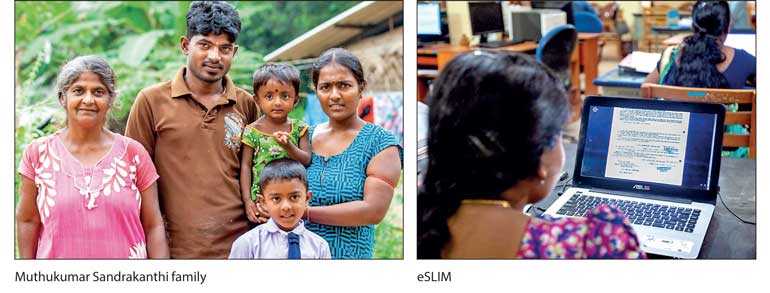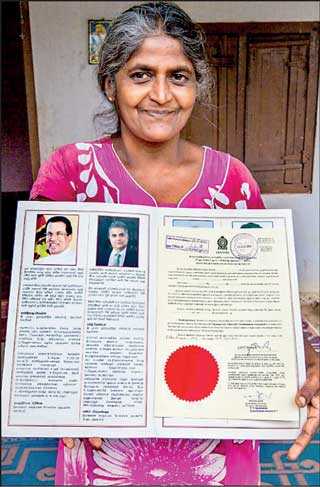Monday Feb 23, 2026
Monday Feb 23, 2026
Thursday, 20 June 2019 00:00 - - {{hitsCtrl.values.hits}}

No time to grieve
Muthukumar Sandrakanthi was only 36 years old when a charging elephant took her husband’s life. He had tried to settle his family in Kilinochchi in Sri Lanka’s Northern Province, but with a conflict underway, Sandrakanthi had no time to grieve – she had four children to raise and protect. Thivahar, her youngest son, was only four years old.
 |
Muthukumar Sandrakanthi |
The end of the conflict would be bittersweet for this family. Thivahar, then 16 years old, was caught in the shelling in the final battle. He broke his right leg while a part of his left hand, including his thumb and index finger were sheared off. The family had been displaced for years by then, so they were sent to a camp for IDPs.
Love at first sight
But it was here that Thivahar met Sujatha. She says it was love at first sight. She was there by his side as Thivahar went through an agonising year of physiotherapy in hospital and was by his side when he emerged on two crutches. They got married in 2011.
Coming home presented its own challenges. “There was nothing left standing on our land,” remembers Sandrakanthi. They used tin sheets to construct a temporary home, but the lack of a toilet made it particularly hard for Thivahar. As he struggled to adjust to his disabilities, finding employment proved even more difficult.
For a while he was employed as a helper in a vehicle service station but found the chemicals aggravated his wounds. He then tried to set up shop as a sound man, supplying speakers, mikes and mixing systems for local events in the temple, but managing the heavy equipment by himself was too difficult.
The latest venture
His latest venture is a food cart. He and Sujatha prepare snacks with Sandrakanthi’s help. They’re delicious – Thivahar often sells out. His profits amount to about Rs. 800 every day. However, this is only true of clear skies and busy working days.
Sometimes, a holiday or inclement weather means no customers. On those days, the family throws away all the food they worked so hard to prepare just hours ago. Thivahar’s expenses are also high – he pays Rs. 10,000 a month in rent on the food cart, and an additional Rs. 200 for a small stall. He also bought a three-wheeler and the loan repayments come to Rs. 12,000 a month. It all adds up.
Which is why neither Sandrakanthi nor Thivahar have been able to save the Rs. 56,000 they needed to hire a surveyor to map out their land – a requirement before they could get their deeds. Fortunately, they were selected as beneficiaries under the European Union (EU) funded Catalytic Support to Peacebuilding program in Sri Lanka.
The € 8.1 million program funded by the European Union is being implemented by the United Nations Children’s Fund (UNICEF), United Nations Development Programme (UNDP), and the United Nations Human Settlements Programme (UN-Habitat) in partnership with a range of state and non-state partners. With funding assistance from the EU, UN-Habitat is implementing this project through the Land Ministry, to ensure the identified land plots are professionally surveyed – Sandrakanthi’s land will be among 10,000 allotments surveyed by the Survey Department for LDO permits with EU support by the project’s end.
The agency is also facilitating the training of the staff and management at the Divisional Secretariats with the support of Provincial Land Commissioner’s office on how to use the new E-SLIM software. Standing for the State Land Information Management system, the online program is streamlining the work of the Divisional Secretariat.
Improving efficiency and turnaround speed
Local laws require that 18 conditions be met before new deeds could be issued to Sandrakanthi. Officers across several levels, including the DS staff, the Divisional Secretary himself and a land registration officer were required to sign off at different stages. Now, this is also done through the system, considerably improving efficiency and turnaround speed.
“Our system can only be accessed by those with a password, and this has ensured the records are secure,” says Thavaselvam Muhunthan Divisional Secretary of the Kilinochchi Divisional Secretariat, adding, “However we needed training to be able to use the system fast, so it was important that we got this support.”
Land registration processes can be challenging for his department because 30 years of conflict in this region means that many of the relevant records are simply missing. In addition, many land deals had been struck without adhering to current guidelines, and this has further complicated situations in which current owners want to sell or divide their lands. In still other cases, ownership itself is in dispute with multiple parties coming forward to claim the same plot.
Land kachcheris – a clinic for land problems
With support from UN-Habitat, Muhunthan and his team have been holding ‘land kachcheris’ – a kind of clinic for people having land problems. Over 200 (of which 50 were supported by EU-CSPB) have been organised in this district, which allowed people to bring their questions and concerns to officers who could then help them resolve disputes. The Land Commissioner General’s Department has processed 5,930 land tenure documents – more than half way to the project’s final target of 10,000.
So far, 13,978 beneficiary households (of a target population of 20,000) have gained improved access to land tenure under the project.
A rare moment of security
For Sandrakanthi, this new system has made a huge difference. She got her deeds just this month – within only 30 days of her application. Before the changes were implemented, it would have taken a year and half. She has also gotten the land divided between her children, to ensure her five grandchildren enjoy their fair share too. It is a rare moment of security for a family still struggling to make ends meet.
“We feel confident now that this land belongs to us. No one can make us leave,” says Sujatha.